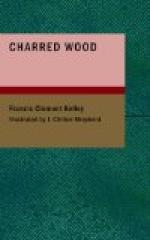But Mark was not so happy in contemplating the rest of the situation. He was getting deeper into a game he knew nothing about. What was the reason for the suspicion against the girl? Could she be a thief—or worse? Mark had heard of pretty criminals before, and he knew that beauty without is no guarantee of virtue within. But he had resolved to go through with the adventure, and he would not change his mind. He argued, too, that it was not entirely the beauty of Ruth Atheson that interested him. There was an indefinable “something else.” Anyhow, innocent or guilty, he made up his mind to stand by her.
At lunch he met Saunders again and found him overly friendly, even anxious to talk. The detective opened the conversation.
“Going to see the Padre again?”
“I have an engagement with him this afternoon. I rather like the Padre!”
“Sure you do,” said the detective. “Everybody does. The Padre’s a wonder, and the last man one might expect to find in a little parish like this.”
Mark wanted to learn more on that score.
“True enough,” he said. “In the Anglican Church they would make such a man a bishop, or at least a dean.”
“Well, they didn’t do that with the Padre.” The detective shook his head as if to express his regret that something of the kind had not been done. “He was the right hand man of the old Bishop of the diocese; but the new Bishop had to have new counselors. That’s one way of the world that the church fellows have gotten into. Some say that it broke the Padre’s heart, but he doesn’t look it. Must have hurt him a little, though. Human nature is human nature—and after all he did for the Church, too.”
“Did he do so much?” questioned Mark.
“Sure he did! You saw the Cathedral, didn’t you, when you passed through the city? Well, the Padre built that, and the big college, too, the one you see from the train. He was president of the college. He was the life and soul of the Catholic Church in this section.”
“Why was he dropped?”
“Search me,” offered the detective. “No one knows that except the Bishop, I guess. Padre came here six months ago. Some of the young priests used to come to see him, but seldom any of the older ones. I got all I know from one of those young chaps—the one I told you I met on the train. He almost cried over the affair.”
“It’s sad enough to make any friend cry over it,” said Mark; “but somehow it makes the man seem bigger to me.”
“True.” Saunders was clearly the Padre’s admirer. “They say he had the best pulpit in London before he went over to the Catholics—big salary, and all that. Then he had to begin all over again as a layman. Went to school, by gosh!—dead game! But when they made him a priest he jumped right to the front. His last money went into the college he built. He has only five hundred a year to live on now. You know, Griffin, if it wasn’t for the rotten way the Church treated him, I honestly believe the Padre could put some religion into me. He’s a power here already. Look at the way he makes that girl at Killimaga work.”




